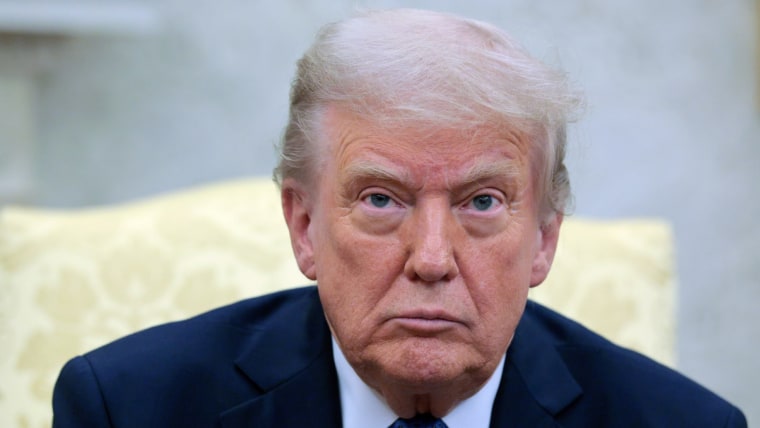President Donald Trump has moved with remarkable speed in his first 100 days, issuing more than 100 executive orders and pushing an agenda that has the potential to rapidly remake America.
The effort comes from some big promises he made on the campaign trail, among them to implement tariffs, carry out mass deportations and end major international conflicts.
Here's a look at many of those promises and whether or not he has followed through:
Promise: End war in Ukraine on or before Day 1
During his 721-day campaign, Trump consistently promised to end the war in Ukraine. At times, he even went as far as to add that he would end it in 24 hours.
“Before I even arrive at the Oval Office, shortly after I win the presidency, I will have the disastrous war between Russia and Ukraine settled,” he told a rally crowd in Waco, Texas, in March 2023, adding, “I will have that settlement done within 24 hours.”
In an interview on former Navy SEAL Shawn Ryan’s podcast in August, he said, “I will have that war settled when I’m president-elect, meaning before I get to office on Jan. 20.”
Status: Failed
One hundred days into Trump's second term, the conflict grinds on. In a recent interview with Time magazine, he claimed that his campaign rhetoric about the conflict was an “exaggeration and "was said in jest."
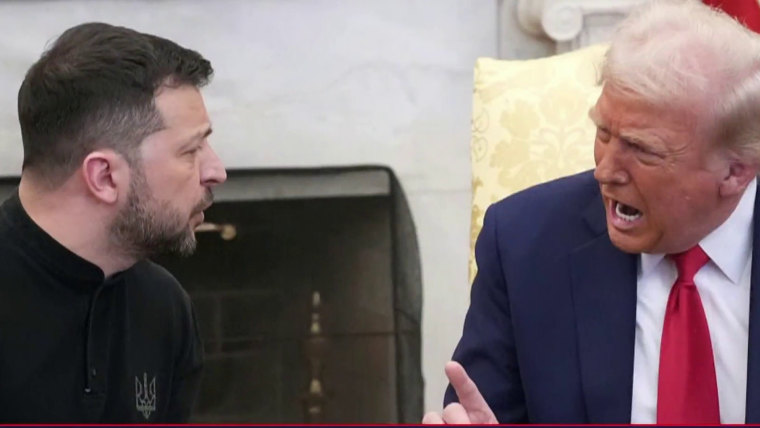
In one of the more memorable days of this administration, Trump and Vice President JD Vance berated Ukrainian President Volodymyr Zelenskyy in the Oval Office, calling him ungrateful and saying he had “disrespected” the United States.
Still, Trump acknowledged during the meeting that ending the war in Ukraine, which has been waged for over three years, would be “a very great achievement if we could get this war stopped and get them back to normalization.”
Promise: End the war in Gaza
Since Hamas terrorists attacked Israel on Oct. 7, 2023, Trump maintained that the attack would not have taken place had he been president at the time. Throughout the campaign, he kept in contact with Israeli Prime Minister Benjamin Netanyahu, even hosting him at his Mar-a-Lago estate in Florida in July. And on several occasions, especially when he was speaking to predominantly Jewish audiences, he promised he would “bring peace back to the Middle East.”
“We’re going to get it to work out,” he told the Israeli-American Council in Washington in September. “I’m the candidate of those who want to defend Western civilization, defend Israel and defend the United States of America. When I return to the White House, we will quickly restore stability in the Middle East, and we will return the world to peace.”
Status: Failed
The beginning of 2025 showed promise; before Trump was sworn in, he dispatched his special envoy to the Middle East, Steve Witkoff, to work with President Joe Biden’s chief negotiator, Brett McGurk. A three-phase ceasefire deal was agreed to on Jan. 15, with Trump, then the president-elect, taking a victory lap.
The deal lasted until March 18, when Israel launched a surprise attack on Gaza and Netanyahu announced that Israel had “resumed combat in full force” against Hamas.
On April 7, during an event with Netanyahu, Trump indicated that the negotiators were close to a deal, saying: “Well, I’d like to see the war stop, and I think the war will stop at some point. That won’t be in the too distant future. Right now, we have a problem with hostages. We’re trying to get the hostages out. We got quite a few of them out, but it’s a long process. It shouldn’t be that long.”
Thirty-three Israeli hostages and 1,800 Palestinians were returned during the ceasefire this year; 59 Israelis taken since the start of the Oct. 7 conflict remain in captivity. The Palestinian death toll since the start of the war stands at 52,243, according to the Gaza Health Ministry; the Israeli death toll is roughly 1,200, according to the Israeli Foreign Affairs Ministry, and 251 people have been taken hostage.
Promise: Close the border
Immigration has long been one of Trump’s top issues in his campaigns. Throughout the 2024 race, he laid out various initiatives aimed at decreasing illegal immigration and the number of undocumented immigrants living in the United States. But largely, his agenda started with sealing the border — particularly the southern border with Mexico.
Trump held more events focused on immigration than any other one topic, including the economy. At a rally in Aurora, Colorado, on Oct. 11, he said: “We will close the border. We will stop the invasion of illegals into our country. We will defend our territory. We will not be conquered. We will not be conquered. We will reclaim our sovereignty.”
Status: Kept
According to U.S. Customs and Border Protection, illegal crossings are at a historic low, having dropped from 211,896 in March 2022 to 8,193 in March 2025, a 96% decrease.
Most recently, Trump took to Truth Social to highlight his accomplishment, writing, “THE SOUTHERN BORDER IS NOW THE STRONGEST AND SAFEST IN USA HISTORY. IT WILL REMAIN SO!!!” and noting “I beat my own record” at an event on April 22.
Promise: Carry out the largest mass deportation operation in U.S. history
Carrying out mass deportations was a cornerstone of Trump’s 2024 campaign, even though he never provided any specifics about how such an operation would be implemented or paid for.
"I will send Congress a bill to ban all sanctuary cities in our country, including Denver, and we will begin the largest deportation operation in the history of the United States," he said at a rally in Aurora, Colorado, in October.
On Oct. 27, just days before the election, Trump reiterated at a rally in New York City, “On Day One, I will launch the largest deportation program in American history to get the criminals out.”
Status: Jury's still out
While the administration did begin deportation operations almost immediately, Trump’s deportation numbers have been lower than those of both Biden and Barack Obama during the same period in their presidencies. But that is largely because the number of border encounters has been significantly lower.
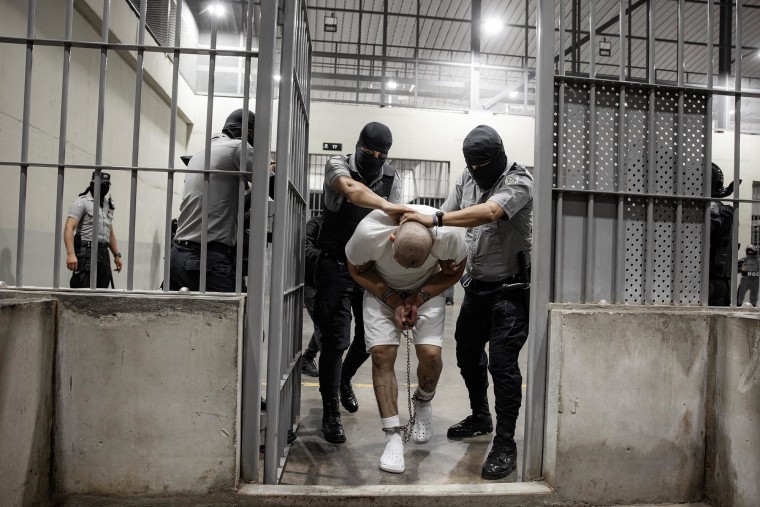
According to Trump’s border “czar,” Tom Homan, the administration had deported about 139,000 people as of Monday.
Trump also faces multiple legal challenges to his deportation orders, many of which have been stayed by the Supreme Court or other federal courts.
Homan told NBC News on Monday that he needs more funding from Congress to carry out Trump’s vision.
“We need more, more money for beds. We need more money for more officers. We need more money for contractors that come in and do nonenforcement jobs and release the law enforcement officers to the street. We need more plane flights. So Congress needs to come through and fund us to keep President Trump’s promise to the American people,” he said.
Promise: End birthright citizenship
In 2023, Trump put out a video proposing to end birthright citizenship and ban what he called “birth tourism.”
“On Day One of my new term in office,” he promised, “I will sign an executive order making clear to federal agencies that under the correct interpretation of the law, going forward, the future children of illegal aliens will not receive automatic U.S. citizenship.”
Status: Jury's still out
Trump signed an executive order ending birthright citizenship on his first day in office. But the order almost immediately faced legal challenges, three of which have made it to the Supreme Court. Arguments will be presented May 15.
Trump has expressed confidence that the order will ultimately be upheld.
“I just think that we’ll end up winning that court, in the Supreme Court. I think we’re going to win that case, and I look forward to winning it,” he said in the Oval Office in late January. “We’re the only country in the world that does this. There’s no other country at this level. There’s no other country in the world that does it. It’s crazy.”
At least four lower-court judges have blocked Trump’s plan.
Promise: Impose tariffs and improve the economy
Trump thinks “tariff” is a beautiful word. He said so, repeatedly, during the campaign.
“The word ‘tariff,’ properly used, is ... one of the most beautiful words I’ve ever heard. It’s music to my ears,” he said at a rally in Savannah, Georgia, on Sept. 24.
It was part of his effort to convince voters that imposing tariffs would help bring back American manufacturing and create jobs.
“And it will not cause inflation, by the way,” he often added, as he did at during the speech in Savannah.
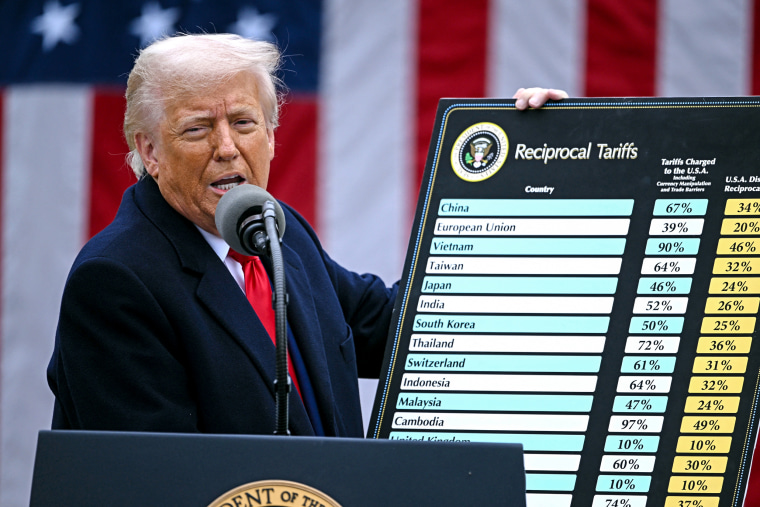
Trump often oscillated on specifics of his tariff plan, at times promising he would impose a 100% tariff on all vehicles from Mexico and at other times proposing 10% to 20% tariffs across the board.
At a speech in York, Pennsylvania, on Aug. 19, he claimed that imposing tariffs — “a small 10% tariff” — on foreign imports would “allow massive tax cuts for working families, create more than 3 million American jobs and raise household incomes by 6%.”
Status: Mixed
Trump’s tariffs have been a roller coaster. He imposed tariffs on Canada, Mexico and China. Then he imposed more tariffs on steel and aluminum. Then he paused the tariffs on Canada and Mexico. Then he unpaused them. Then he imposed what the administration called reciprocal tariffs. Then he rolled them back but increased the tariffs on China.
In his address to Congress in early March, he acknowledged that there would be some pain before the economy adjusted to the tariffs: “Tariffs are about making America rich again and making America great again, and it’s happening, and it will happen rather quickly. There’ll be a little disturbance, but we’re OK with that. It won’t be much.”
There has been more than a "little disturbance"; his first 100 days have been the worst for the stock market since Richard Nixon’s presidency, with a cliff dive around April 2, Trump’s “Liberation Day.”
Promise: End inflation and lower prices
Flanked by groceries on either side of the podium, Trump summoned the campaign media corps and a small group of supporters to his club in New Jersey in August to tell them: “When I win, I will immediately bring prices down, starting on Day One.”
Just a few days later, in York, Pennsylvania, he told a large rally crowd that “this will help us quickly defeat inflation and make America affordable again.”
It was a promise he made in most of his economy-focused speeches, especially toward the end of the campaign, when many voters said the economy and prices were their main concern.
Status: Mixed
During his 100 days in office, inflation has cooled from 3% to 2.4%. However, the tariffs and unruly markets have made economists jittery. Prices, especially at the grocery store, have continued to rise, especially because of the tariffs on imported foods. Consumer confidence hit a 12-year low in March.
Trump nevertheless projected confidence at a Rose Garden event on April 2, the day he imposed “reciprocal” tariffs.
“Groceries went through the roof, and I campaigned on that. I talked about the word ‘groceries’ for a lot. And energy costs now are down. Groceries are down. Gasoline is way under $3, and people are beginning to be able to buy things and live again. We brought prices way down,” he said.
The numbers tell a different story. The rate of inflation has decreased from 3% in January to 2.4% in March, according to the Bureau of Labor Statistics. Prices, however, have either increased or stayed relatively the same. The average price of eggs increased from $4.95 in January to $6.22 in March. The average price of bacon dropped 70 cents from January to March. And the price of gas has stayed relatively flat, increasing just 20 cents a gallon from January to March.
Promise: Make government more efficient
At a speech to the Economic Club of New York in September, Trump announced that he would create a government efficiency commission — an idea first floated by billionaire tech executive Elon Musk — that would be “conducting a complete financial and performance audit of the entire federal government and making recommendations for drastic reforms.”
“As the first order of business,” he said, “this commission will develop an action plan to totally eliminate fraud and improper payments within six months. This will save trillions of dollars, trillions.”
Status: Failed
The commission became a reality with DOGE (the Department of Government Efficiency), which was one of the splashiest and most attention-grabbing initiatives of Trump’s first 100 days. The savings, however, have been far from the $2 trillion initially promised.
DOGE’s website estimated $160 billion in savings, just 8% of its original goal. But that estimate may be inflated, given that DOGE’s reporting has been riddled with errors and misleading claims.
Those figures also don’t take into account the expenses associated with DOGE’s work, including legal fees, salaries and money spent on carrying out some of the massive changes — such as when the Agriculture Department accidentally fired and tried to rehire workers who were crafting the response to the H5N1 bird flu outbreak.
The cuts also don’t factor in that Musk’s basket of policy proposals would actually add to the deficit, according to budget experts.
Musk’s sledgehammer approach to restructuring the government through layoffs and eliminating entire agencies within departments has created significant confusion and uncertainty, with workers’ job statuses and missions often changing. Many of DOGE’s actions have been challenged and are awaiting rulings in courts.
At a news conference in the Oval Office, in which Trump claimed billions had been found in savings through DOGE, Musk defended his department’s actions, saying: “The people voted for major government reform. There should be no doubt about that. That was on the campaign. The president spoke about that at every rally, the people voted for major government reform, and that’s what people are going to get. They’re going to get what they voted for.”
Promise: Ban transgender athletes in women's sports
Every time Trump declared that “I will keep men out of women’s sports” at his campaign rallies, it was his largest applause line.
Status: Kept
In early February, Trump signed an executive order banning transgender women and girls from competing in women's sports. It was the fourth executive order targeting transgender people he signed after he was inaugurated.
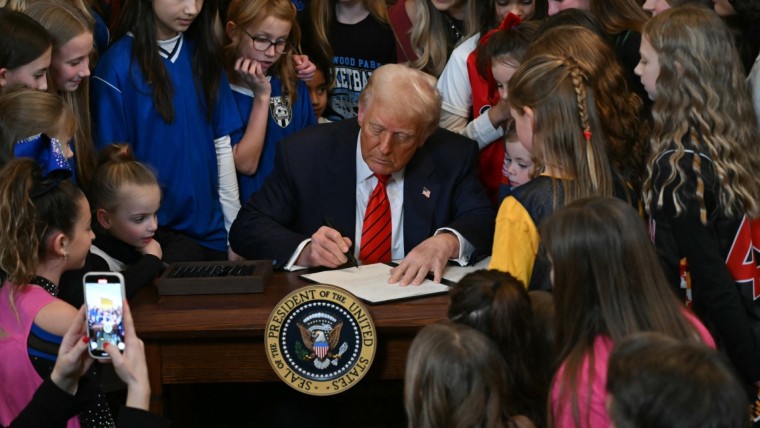
The NCAA — a nonprofit organization that regulates student athletics among 1,100 colleges and universities across the United States — quickly complied with the order.
“No matter how many surgeries you have or chemicals you inject, if you’re born with male DNA in every cell of your body, you can never become a woman. You’re not going to be a woman. And that’s why, last month, I proudly signed a historic executive order to ban men from competing in women’s sports and it was very popular — very, very popular,” Trump said at a Women’s History Month event in March.
The order, however, faces legal challenges after the state of Maine refused to comply with it. When the administration pulled educational funding because of the state’s refusal, the governor sued the administration. The lawsuit is pending.
Promise: Eliminate the Education Department
“Returning education to the states” and giving more control to parents was a policy Trump often repeated on the campaign trail.
“I want to close the Department of Education and move education back to the states with the law, and where parents have total control of their children’s lives,” Trump said at a Turning Point Action summit in West Palm Beach, Florida, in July 2023.
Status: Failed
Trump has slashed the Education Department — implementing mass layoffs, pulling funding and cutting programs — but it requires an act of Congress to eliminate the department fully.
While Trump claimed that he signed an executive order “eliminating the Department of Education once and for all,” he later couched the statement, saying: “And I think it won’t be that long before the states will be really running the Department of Education. ... So I think you’re going to see a tremendous change very quickly having to do with education.”
Promise: Cover IVF
Trump told NBC News in August that he was going to provide government coverage for IVF treatments.
“We are going to be, under the Trump administration, we are going to be paying for that treatment,” he said, adding, “We’re going to be mandating that the insurance company pay.”
He failed to provide any specifics about how the policy would be implemented or how it would be paid for.
Status: Jury's still out
Trump signed an executive order directing his policy team to provide policy recommendations on how to protect IVF and reduce out-of-pocket costs for the treatment within 90 days. But he has yet to announce any of the recommendations to implement a plan. The lack of specifics didn’t stop him from referring himself as “the fertilization president” at a Women’s History Event at the White House in March.
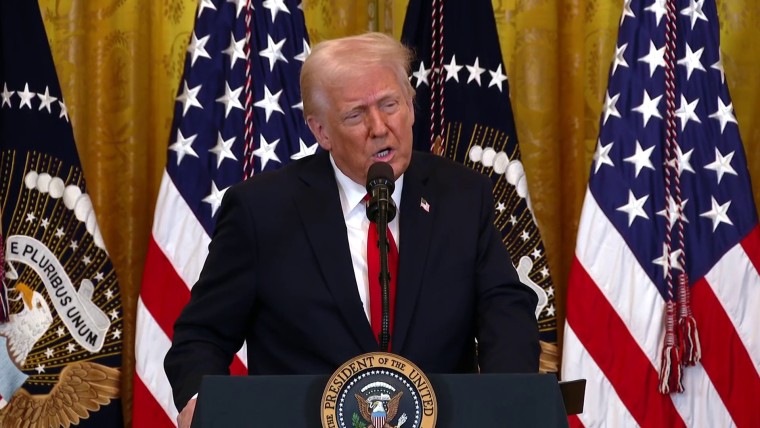
Promise: Pardon Jan. 6 rioters
The first indication that Trump would pardon convicted Jan. 6 rioters was in March 2023, when he played a version of “The Star-Spangled Banner” recorded by the “J6 choir” — a group of Jan. 6 defendants who were incarcerated and awaiting trial — at his rally in Waco, Texas.
For a few months, he and his campaign hedged on the topic, saying they would consider each case individually. But then, roughly a year later, Trump confirmed his commitment to pardons, posting on Truth Social, “My first acts as your next President will be to Close the Border, DRILL, BABY, DRILL, and Free the January 6 Hostages being wrongfully imprisoned!”
In July, at a panel hosted by the National Association of Black Journalists, he also said “I absolutely would” when he was asked whether he would pardon the Jan. 6 rioters.
“If they’re innocent, I would pardon them,” he continued. One of the moderators, ABC News’ Rachel Scott, pushed back, saying, “They’ve been convicted.”
Status: Kept
On his first day in office, Trump issued roughly 1,500 pardons and commutations for his supporters in connection with the attack on the U.S. Capitol.
Promise: End DEI in government
In an early campaign video, Trump claimed that Biden was "weaponizing every tool of government power to push this racism and this communism and Marxism."
"I will instruct the Department of Justice to make clear that any such discrimination is completely and totally illegal," he added, "and to investigate the unlawful domination and discrimination and civil right abuses carried out by the Biden administration.”
Trump bashed diversity, equity and inclusion initiatives, promising to end related hiring practices and training in government.
Status: Kept
Trump has signed various executive orders eliminating DEI programs at different agencies. One order directed “all departments and agencies to take strong action to end private sector DEI discrimination, including civil compliance investigations." The administration has targeted nearly 50 companies that it deemed to be in violation of its anti-DEI rules, according to a Bloomberg report.
Most recently, on March 18, he directed the Education Department to end all its DEI initiatives.
“I’ve ended all of the so-called diversity, equity and inclusion programs across the entire federal government and the private sector and notified every single government DEI officer that their job has been deleted. They’re gone. They’re fired,” he boasted at the Conservative Political Action Conference in February.
Trump has also issued executive orders taking aim at private institutions — including universities and law firms — and pressuring them to end DEI practices.
A number of companies have complied.
